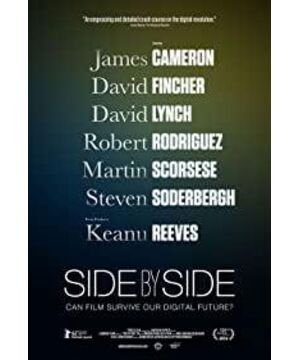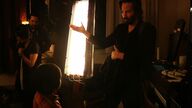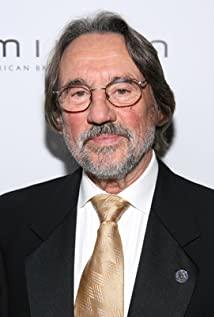After watching this documentary about the digital battle of film film, I feel that I have taken a very informative course in film history and film technology history. Indeed, although this documentary is only less than 100 minutes long, it tells about a very important event in the history of film - the digital revolution and the decline of film.
Except for a few directors or DPs, most filmmakers have turned to digital cinema. Although directors and DPs have negative attitudes towards digital in terms of technical barriers, it has become an irreversible trend that digital replaces film as the mainstream of filmmaking as technology advances. With the emergence of the machine Ale Alyssa, digital production, and the feel of film, some "stubborn" guys began to flock to digital cameras. This also shows that directors, DPs and many film practitioners are more accustomed to film, not that film has an advantage over digital. And for the all-round changes in film production brought about by digital revolution, such as picture quality, picture resolution, latitude, editing, screening, archiving, etc., people's understanding of digital is a process, a process of technological development. When technology develops to this point, the advent of 14-stop or higher cameras, SSDs and faster and better nonlinear editing software, the existence of color correction software, and the replacement of the bulky KEN editing table, they will all open up to digital. tight arms. Film will not disappear completely within a hundred years, and people's feelings for film are enough to keep it going for a while.
In the end, documentaries return to the essence of film, whether it is film or digital, it is for images and stories. Like David Lynch said, everyone has a pen and paper, but not everyone can write a great story, as long as a good story can be told, the medium doesn't matter that much. Lynch is also a calm and intelligent person, compared to Finch and Lucas, two numbers of radicals. Lucas, a Hollywood technology giant, can be said to be directly responsible for the decline of film, while a great god like Nolan has a cold British temperament and insists on film shooting. In any case, within a hundred years, although there will not be such a situation that one will grow and one will grow, but each will go its own way.
There are a few places that are quite interesting. For example, at that time, the longest film shooting could be 10 minutes. After that, the film box had to be changed. At this time, the actors could take a break and think about the next performance. But after the advent of digital photography, it is possible to shoot for 40 minutes without interruption. When the actors are acting, the director can guide the actors, and the actors must continue to act. For this reason, Robert Downey Jr. protested with a urine bottle on the set. If you don't give me a break, I will pee with a bottle and slap you to death, haha. There is also the "Slumdog Millionaire" DP filmed a movie with DV after the advent of digital photography, "28 Days Shocked", because of the industry's unprofessional criticism of DV filming, saying that he would never be able to take it. Here comes the Oscar for Best Cinematography.
There is no suspense in the battle between film and digital, but everything is a double-edged sword. The development of digital photography technology has led to a lowering of the threshold for film production. You can make a film with a 5D camera. Similar to NYU graduate students shooting student homework, the biggest contribution of digital is to reduce the budget and be able to shoot their own works. But what we have to face is that people's taste for movies is lost, fast-moving consumer goods appear in large numbers, and the quality of movies begins to decline, which is very sad. Perhaps this is also the result of the entry of a large number of non-professionals due to the lowering of the threshold, but everything is unknown. Perhaps in the near future, the lowering of the threshold will also lead to the improvement of film education, which will provide another opportunity for the development of future films. expect!
View more about Side by Side reviews











